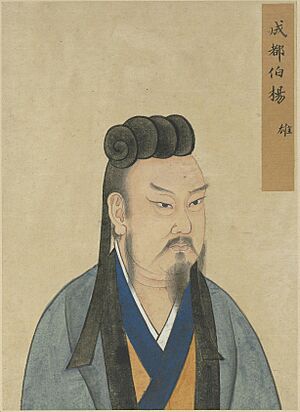Yang Xiong (author) facts for kids
Quick facts for kids Yang Xiong |
|||||||||||||||||||||||||||||||
|---|---|---|---|---|---|---|---|---|---|---|---|---|---|---|---|---|---|---|---|---|---|---|---|---|---|---|---|---|---|---|---|

Medieval representation of Yang Xiong
|
|||||||||||||||||||||||||||||||
| Traditional Chinese | 揚雄 | ||||||||||||||||||||||||||||||
| Simplified Chinese | 扬雄 | ||||||||||||||||||||||||||||||
|
|||||||||||||||||||||||||||||||
Yang Xiong (born 53 BCE, died 18 CE) was an important Chinese thinker, poet, and government official. He lived during the Western Han dynasty. He is famous for his deep philosophical ideas and his special poems called fu.
Contents
Yang Xiong's Life and Work
Yang Xiong came from a place called Shu, which is now Sichuan province in China. Many famous writers from the Han dynasty were also from this area. Yang Xiong believed his family moved south from the state of Jin a long time ago.
When he was young, Yang Xiong admired another writer from Shu named Sima Xiangru. He tried to write poems in the same grand fu style. His talent for writing fu poems helped him get a job in the capital city, Chang'an. He became an "Expectant Official," which meant he wrote poems and fu for the emperor.
Writing for the Emperor
Yang Xiong's job was to praise Emperor Cheng of Han and the amazing imperial events. However, he was worried about how much money the emperor's court was wasting.
He tried to make fu poems go back to their original purpose: to gently warn or advise people. He thought this was how the earliest fu poems by Qu Yuan were used. But Emperor Cheng did not notice or follow Yang Xiong's advice about spending less.
Famous Books and Writings
Yang Xiong wrote several important books. His most famous work is the Fayan. This book is like the Analects of Confucius, but Yang Xiong used it to share his own ideas. In it, he said that fu writers focused too much on fancy words and not enough on important things like being good.
He also wrote the Taixuanjing, a book about telling the future, similar to the I Ching. Another work, "Justification Against Ridicule" (Jiě cháo), is a well-known example of a fu poem about feeling frustrated. Yang Xiong also created the Fangyan, which was a dictionary of words used in different parts of China.
Yang Xiong and Sima Xiangru were two of the most celebrated people of the entire Han dynasty. The official history book, Book of Han, has a whole two-part chapter just about them. This was a very high honor, even more than what famous generals or ministers received.
Yang Xiong's Philosophy
Yang Xiong had his own ideas about human nature. He did not agree with Mencius, who thought people were born good. He also disagreed with Xunzi, who believed people were born bad. Instead, Yang Xiong thought that human nature was a mix of both good and bad from the start.
He was good friends with the philosopher Huan Tan. Huan Tan might have influenced the ideas of another famous thinker, Wang Chong. Yang Xiong was also known for speaking out against fu poems that used too many words or were too complicated. Huan Tan even called him the "Confucius from the western parts," showing how much he respected Yang Xiong's wisdom.
 | Percy Lavon Julian |
 | Katherine Johnson |
 | George Washington Carver |
 | Annie Easley |

